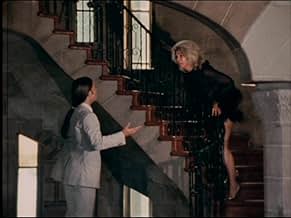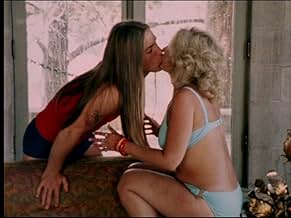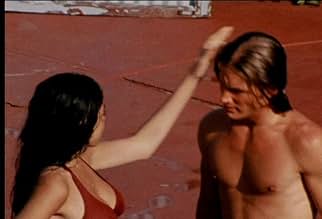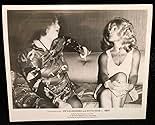Aggiungi una trama nella tua linguaSpoof of the casual sexual adventures of a one-time child actor in Hollywood. It also involves a bratty on-again, off-again lesbian character.Spoof of the casual sexual adventures of a one-time child actor in Hollywood. It also involves a bratty on-again, off-again lesbian character.Spoof of the casual sexual adventures of a one-time child actor in Hollywood. It also involves a bratty on-again, off-again lesbian character.
- Regia
- Sceneggiatura
- Star
- Premi
- 1 vittoria in totale
Recensioni in evidenza
In place of opening credits, an intertitle asserts: "In 1971 another film studio, the Fox Lot on Sunset Boulevard was torn down." Cut to an attractive young man standing on a demolition site.
Several strands are immediately established. The historical development of Hollywood as a geographical area, former nexus of the film industry. A metaphor for the re-working of the Billy Wilder classic. A scene of empty desolation as a metaphor of Warhol minimalism. And the emptiness into which our protagonist will seek to re-enter his former glory.
Joey, the youngster on the empty lot, is a former star child actor, now struggling to make a living. He rents a room at Lydia's motel. A respectable place. Especially now there's a 'star' staying there. Joey needs to keep overheads down so isn't averse to advances from fat, middle-aged Lydia. But through a chance meeting with another resident, Joey meets the very well-heeled Sally Todd (Sylvia Miles). Sally is middle-aged but well-preserved. She disapproves of the pervs at Lydia's motel, including the brothers who earn a living by having sex on stage, and her own daughter Jessica who is going through a lesbian 'phase'. Joey latches on to Sally. She buys him expensive gifts, and tries to get him back into movies. Sally has all the trappings of success, although we sense that her 'stardom' days were maybe slightly more modest than she lets on. If Joey plays his cards close to his chest, Jessica is completely up-front about her relationship with 'Mom', openly claiming she's only interested in her money.
Morrissey uses Warhol's distancing techniques to establish Brechtian analysis on the part of the audience. Much of the acting and editing is amateurish, as if the characters are mere ciphers for the themes they represent. The sexually charged sequences make this apparent at gut-level. When Joey lets Lydia seduce him, the palpable sexual excitement is in stark contrast to the blandness of much of what has gone before. As bored Joey gropes her under her dress, the unashamed lust on the face of this less-than-attractive, sexually frustrated, middle-aged woman is like something off a reality show. The control-freak has scored and lets herself loose. It has neither the manufactured, over-acted look of pornography nor the air-brushed unbelievability of the 'erotic' scenes from mainstream movies.
When Sally enters the story, things progress to a more traditionally dramatic level (Sylvia Miles went on to become twice Oscar-nominated for later films). Her craziness is of the blind sort that often goes with sexual obsession focused on a much younger partner. Her wealth, success and social standing have blinded her and made her intolerant, denying even the possibility that her daughter could be lesbian. Sally's hypocrisy is exposed when Jessica later makes a jealous play for Joey.
The moral ambiguity is developed by making the younger characters sympathetic. They are open-minded, decent people in many ways. Sally's traditional morality is exposed not only as bigoted but (more importantly to anyone who sympathises with ultra-conservative values) self-deluding and sexually controlling. This makes us reconsider the morality of the youngsters, who are using their good looks simply to survive. They are also, by comparison, in control of their sexuality, whereas the older characters are enslaved by it.
In Wilder's Sunset Boulevard, we can now question the ethics of all the characters, including the clean-cut Betty Schaefer. Like Jessica, she is just doing the job for the money, and has no qualms about renouncing her engagement when she gets a more lubricious offer. Boulevard's Joe Gillis, like the Joey of Heat, really has no faithfulness to anyone. He rejects the younger, more attractive girl rather than blow his material fortune. Like it or not, the crazy Sally Todd (Sylvia Miles) / Norma Desmond (Gloria Swanson), has her feelings protected by society.
Morrissey takes bare Warhol aesthetic and makes it accessible. To Warhol, cinema was a visual perception-event, an art experience to challenge how we observe. Morrissey uses the trappings of narrative, pulling us into the experience by associating the familiarity of a conventional movie. Many of his films appeal to minority audiences. Heat, although containing themes that some might still find offensive, can appeal to most thinking audiences. Character-for-character comparisons with Sunset Boulevard instantly raise it above the "unsavoury piece of work laced with sex, lesbianism, self-abuse and perversion" with which one tabloid equated it.
Heat's sheer comic inventiveness will keep you glued to your seat wondering what surprise turn will hit you next. As an unassuming introduction to the work of Morrissey (and his mentor Warhol) it is possibly unsurpassed. Filmed in LA over a two-week period, for a budget of $50,000, it is a remarkable accomplishment in arresting film technique, improvisation, and stark observation of contrasting social mores. It throws new light on an old classic (which should be viewed first) and is also an acute commentary on the weird and wonderful world of 70's LA. Heat is an insightful film for the discerning; and a fresh, unpredictable romp for the liberated.
Heat is an honest and hilarious portrayal of dysfunction, ugliness and despair with comedic innocence at its core. It is a visionary look into the souls of the much-less-than-beautiful people in a sun-bleached setting where poverty and suicide lurk just around the corner to glamor (glamor that is only parodied by the impoverishment of the production). At the height of their improbability, the characters are more real, more vivid and enigmatic than 99.9% of Hollywood factory fare. In the moments of their most wooden acting, the fascinations of the real person - whether it be the gapingly numb Joe Dallesandro, the ogrishly preening Pat Ast or the gonzo mystery of Andrea Feldmen, emerges with overexposed brilliance.
Sylvia Miles plays her role with subtlety and iconic ugliness. She is not trying to look "marketable," as so many do, but to play a part as naturally as a spirited animal defecating in a forest. There is rarely an ending so original in a film, too - the impotence of further tragedy in an already so tragic film. Burning through the most awkward of 70s fashion and through its slick rivals with fashion-model actors, Heat is raw psychological meat on an open flame.
Lo sapevi?
- QuizThe title song, "Days of Steam," was written and performed by John Cale, a founding member of the group The Velvet Underground. The song is taken from Cale's album The Academy in Peril (1972, Reprise). Andy Warhol agreed to do the cover art for the album in exchange for the use of "Days of Steam" in the film.
- BlooperWhen Harold enters and greets Joe and Andrea, he mistakenly calls Andrea by her real name and not her character's name ("Jessica").
- Citazioni
Sally: ...And you're NOT a lesbian. I mean, everybody has girlfriends. Men have friends, women have friends. That doesn't make you a lesbian. Do you sleep in the same room with her?
Jessica: Sure. How else can I be a lesbian?
Sally: Where does Mark sleep?
Jessica: With us.
Sally: In the same bed?
Jessica: In the same bed.
Sally: Is that a way to bring up a boy? He'll be a lesbian!
- Curiosità sui creditiThere are no closing credits. It just says "End."
- ConnessioniEdited into Porno e libertà (2016)
I più visti
- How long is Heat?Powered by Alexa
Dettagli
Contribuisci a questa pagina

























